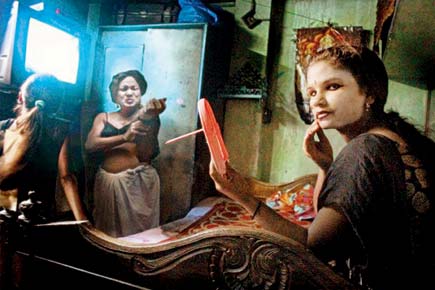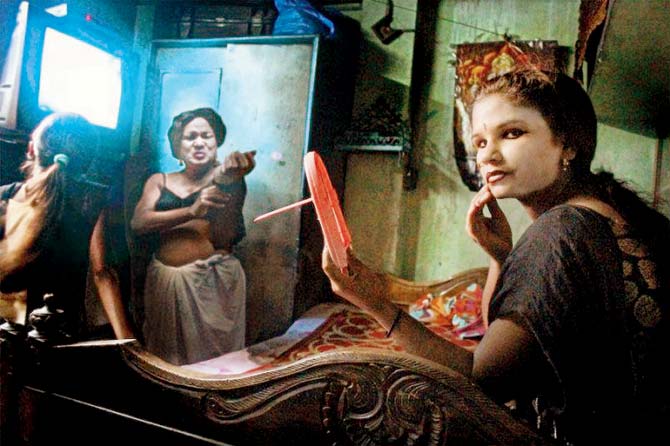Earlier this week, photographer Souvid Datta, who had shot a series of photographs in a brothel in Kolkata's red light district of Sonagachi, was outed by critic Shreya Bhat, for having not simply plagiarised an idea, but photoshopping someone else's work into his own


"In the Shadows of Kolkata" by Souvid Datta uses a doctored image of a Mumbai brothel originally shot by Mary Ellen Mark in the 1970s
ADVERTISEMENT
 Earlier this week, photographer Souvid Datta, who had shot a series of photographs in a brothel in Kolkata's red light district of Sonagachi, was outed by critic Shreya Bhat, for having not simply plagiarised an idea, but photoshopping someone else's work into his own. Not just anyone's, but the work of Mary Ellen Mark, the most famous photographer of brothels that there is!
Earlier this week, photographer Souvid Datta, who had shot a series of photographs in a brothel in Kolkata's red light district of Sonagachi, was outed by critic Shreya Bhat, for having not simply plagiarised an idea, but photoshopping someone else's work into his own. Not just anyone's, but the work of Mary Ellen Mark, the most famous photographer of brothels that there is!
Following the scandal that erupted, Datta has admitted to incorporating the work of several other photographers as well. But, in an extensive interview with Time magazine he presents himself as a desperate ingénue. He says he had done this to be validated, the perpetual struggle of all artists. It is true what they say: beware of anyone who says sorry too quickly, for it's not that they repent. It's that they do whatever is expedient without blinking - copying or apologising in this case.
In a digital era, the idea of plagiarism and the idea of remixing culture - the aesthetic norm of the Internet - exist in uneasy proximity. When is something a reference or homage and when is it simple theft?
At times this is hard to tell. Artists often admit to inspiration by convention. In poetry, for instance, there is a norm of quoting a line of a poem that has set off the composition of another through some internal artistic alchemy.
Filmmakers sometimes mimic the shot of a filmmaker they admire. Vishal Bharadwaj's beautiful composition in the film Ishqiya - Dil toh baccha hai ji - clearly influenced by the tune Bolero, recalls the piece in its opening musical phrase.
This practice admits to art as a dance of artists with each other's ideas. It also may work better when there is an intimate audience aware of all these works. In an expanding media world, this has to be indicated in other ways - forms that foreground their construction, like collage, for example.
When you actually take a piece of someone else's work and insert it into your own without flagging it, stylistically, that is unambiguously stealing.
Mr Datta excuses himself in his interview. "I was young and did not understand the ethics of photography," he says. But, there are no ethics of photography involved. Ethics of cheating and lying are universal ethics.
On the one hand, the large corporation regimes of intellectual property rights, often based on the unfair extraction of artist's works and rights are based on a similar fundamental dishonesty. Hindi film songs' tunes take from folk culture claiming it is common property, but then refuse to be part of common property themselves. This dishonesty is countered by an equal disingenuousness by the unsettling claims of some counter-cultural artists that they can use any image out in the world as they do not believe in copyright - and profit hugely from it themselves. The false legality of copyright and false revolution of this 'copyleftish' art enjoins a language of dishonesty in art circulates.
The ethical space of art is a complex one - it is based sometimes on knowing what inspired you, or recognising influence and acknowledging it. It has nothing to do with law and 'being young' or even counter cultural and everything to be with inner truth. Or as Bob Dylan sang, "to live outside the law, you must be honest."
Paromita Vohra is an award-winning Mumbai-based filmmaker, writer and curator working with fiction and non-fiction. Reach her at www.parodevipictures.com
 Subscribe today by clicking the link and stay updated with the latest news!" Click here!
Subscribe today by clicking the link and stay updated with the latest news!" Click here!







